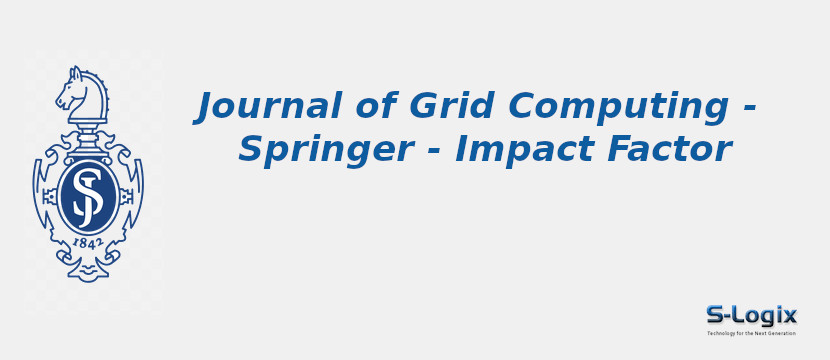The Journal of Grid Computing is a peer-reviewed publication by Springer dedicated to the advancement of research and development in the field of grid computing. The journal covers a wide range of topics, including the design, implementation, and evaluation of grid computing systems and applications. It serves as a platform for scholars, researchers, and practitioners to publish original research articles, reviews, and case studies that advance the understanding and application of grid computing technologies.
Objective:
The primary objective of the Journal of Grid Computing is to promote research and innovation in grid computing. The journal aims to explore theories, methodologies, algorithms, and applications that enhance the performance, scalability, and usability of grid computing systems. By publishing high-quality research, the journal seeks to address the challenges and opportunities in deploying effective grid computing solutions for various applications.
Interdisciplinary Focus:
The Journal of Grid Computing adopts an interdisciplinary approach, welcoming contributions from various fields related to grid computing. This includes, but is not limited to, areas such as computer science, engineering, information technology, and applied mathematics. The journal encourages research that bridges the gap between theoretical developments and practical applications, fostering collaboration and innovation across disciplines. This interdisciplinary perspective helps in developing advanced grid computing solutions that address real-world challenges in diverse fields such as scientific computing, data analysis, and complex simulations.
Global Reach and Impact:
With a broad international readership and authorship, the Journal of Grid Computing has a global reach and impact. Its publications contribute to the dissemination of knowledge and advancements in grid computing worldwide. The journal content influences both academic research and practical applications, driving progress in areas such as distributed computing, resource management, and large-scale data processing.
High Standards and Rigorous Review:
Maintaining high academic standards, the Journal of Grid Computing conducts a rigorous peer-review process. Each submitted manuscript undergoes thorough evaluation by experts in the field to ensure the quality, originality, and scientific rigor of the research. This stringent review process upholds the integrity and reputation of the journal, ensuring that only high-quality and impactful research is published.
Significance:
The Journal of Grid Computing plays a significant role in advancing research and practice in the field of grid computing. By providing a platform for the publication of cutting-edge research findings, the journal contributes to the growth of knowledge and innovation in grid computing technologies and applications. It serves as an essential resource for researchers, practitioners, educators, and students interested in understanding and leveraging grid computing to solve complex computational problems and improve the efficiency of large-scale computing systems.
Journal Home: Journal Homepage
Editor-in-Chief: Tamas Kiss
scope:
The journal provides a platform for researchers, practitioners, and scholars to present their latest findings, innovations, and theoretical advancements in grid computing. It covers a wide range of topics that encompass the design, development, implementation, and evaluation of grid computing systems and applications. Here is an overview of its key focus areas and scope:
1. Grid Computing Architectures:
Research on the design and development of grid computing architectures, frameworks, and infrastructures.
Advancements in the scalability, interoperability, and performance of grid systems.
2. Resource Management and Scheduling:
Exploration of algorithms and techniques for resource management and job scheduling in grid environments.
Research on load balancing, resource allocation, and optimization strategies for efficient grid computing.
3. Middleware and Tools:
Advancements in middleware solutions and tools that facilitate the development and deployment of grid applications.
Research on middleware services, APIs, and toolkits for managing grid resources and workflows.
4. Data Management and Storage:
Exploration of data management techniques and storage solutions in grid computing environments.
Research on distributed data storage, data replication, and data access methods for large-scale grid applications.
5. Security and Privacy:
Advancements in security and privacy techniques for protecting grid computing environments.
Research on authentication, authorization, encryption, and secure communication protocols in grid systems.
6. Grid Applications and Case Studies:
Exploration of grid computing applications across various domains such as science, engineering, healthcare, and business.
Case studies demonstrating the practical implementation and benefits of grid computing in real-world scenarios.
7. Cloud and Grid Integration:
Advancements in the integration of cloud computing and grid computing technologies.
Research on hybrid cloud-grid architectures, resource federation, and service orchestration across cloud and grid environments.
8. Performance Evaluation and Benchmarking:
Exploration of methodologies for evaluating the performance and efficiency of grid computing systems and applications.
Research on benchmarking techniques, performance metrics, and experimental results from grid deployments.
9. Grid Computing Standards and Protocols:
Advancements in the development and adoption of standards and protocols for grid computing interoperability.
Research on standardization efforts, protocol design, and compliance testing in grid systems.
10. Future Trends and Emerging Technologies:
Exploration of future trends and emerging technologies in grid computing.
Research on next-generation grid architectures, new paradigms, and innovative applications that push the boundaries of grid computing.
Print ISSN: 1570-7873
Electronic ISSN: 1572-9184
Abstracting and Indexing: Science Citation Index Expanded, Scopus.
Imapct Factor 2023: 5.5
Subject Area and Category: Computer Sciences, Library and Information Science, Electronics and Telecommunications
Publication Frequency: Quarterly
H Index: 59
Q1: Computer Networks and Communications
Q2:
Q3:
Q4:
Cite Score: 8.7
SNIP: 1.721
Journal Rank(SJR): 1.242
Latest Articles: Latest Articles in Journal of Grid Computing
Guidelines for Authors: Journal of Grid Computing Author Guidelines
Paper Submissions: Paper Submissions in Journal of Grid Computing
Publisher: Springer
Country: Netherlands
